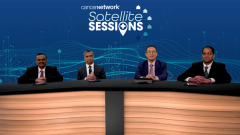
Opinion|Videos|January 23, 2024
Treatment Strategies for NSCLC Following Progression on Adjuvant Immunotherapy
Oncology experts from the University of Kansas discuss treatment strategies for both resectable and unresectable non-small cell lung cancer (NSCLC) following progression on adjuvant immunotherapy, providing valuable insights into navigating the challenges posed by this evolving clinical scenario.
Advertisement
Episodes in this series

Newsletter
Stay up to date on recent advances in the multidisciplinary approach to cancer.
Advertisement
Latest CME
Advertisement
Advertisement
Trending on CancerNetwork
1
Modifiable Risk Factors Suggest Potential for Improving Cancer Prevention
2
2026 Tandem Meetings: What’s the Latest Research in Multiple Myeloma?
3
Dato-DXd Receives Priority Review in Unresectable/Metastatic TNBC
4
Barriers to CAR T-Cell Referral and Center Access in Multiple Myeloma
5






































